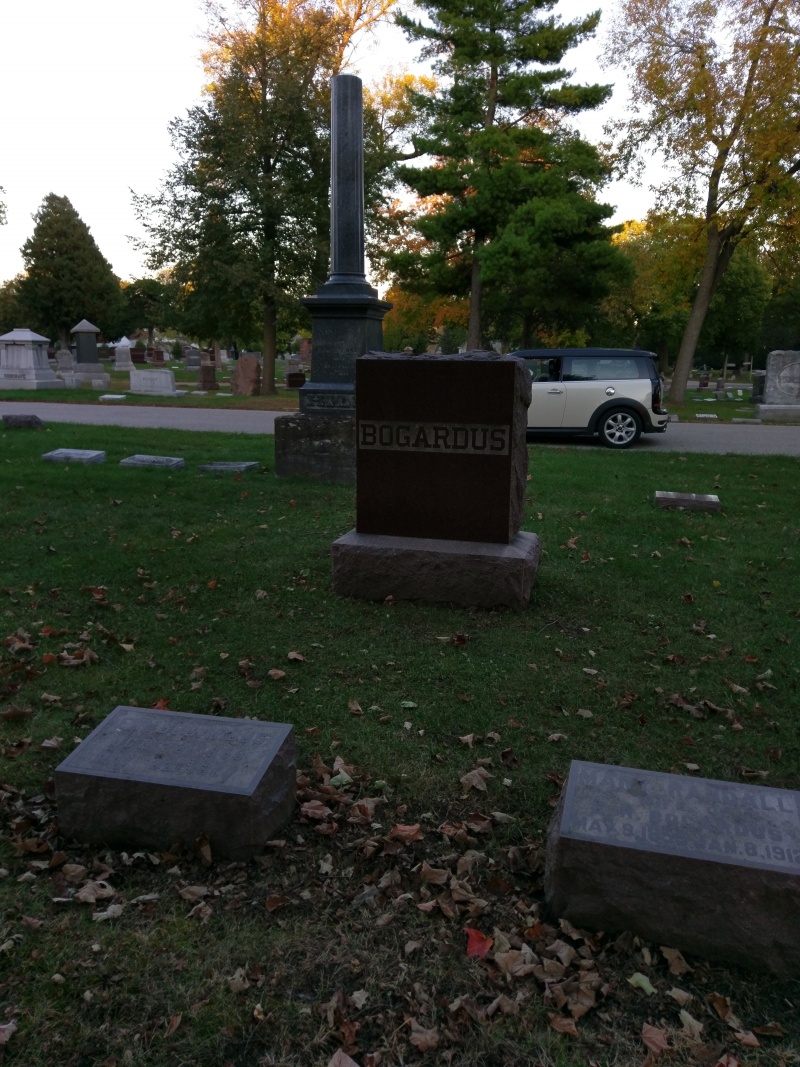The Architect: Difference between revisions
No edit summary |
No edit summary |
||
| (10 intermediate revisions by the same user not shown) | |||
| Line 1: | Line 1: | ||
The Longnecker house was designed and built by E.R. Bogardus for Jennie Longnecker. There is some good information about him in the application of the Duncan Rule House to join the National Register of Historic Places. See below | |||
=Duncan Rule House National Register Application= | |||
The house was designed by E.R. Bogardus (1850-1927), a long-time resident and builder in Mason City. Bogardus came to Mason City as a child. He opened a contracting business in 1873. Although he apparently had no formal architectural training, he gradually began to design, as well as construct, houses, and after 1894 devoted all his time to architecture. During his long career, Bogardus was responsible for numerous buildings in Mason City. His works included the mission-style Calvary M.E. Church (1913); the Georgian/Federal Revival Vermilya (1894), [the house next door to the Longnecker House], Markley (c. 1902), and Keerl (c. 1894) houses; the City Park Hospital (1909), and the Queen Anne Longenecker house (1898), as well as assorted commercial buildings. He designed two houses using elements of the Shingle idiom: the Duncan Rule house and its precursor, the George Wilson house (1907). The latter is far more vernacular than the Rule house. It does, however, display features that Bogardus used to good effect on the Rule house: the high, dominating gable extended over a porch; the rounded corner projection, and the very large hipped dormer. The columns and protruding rafter ends of the porch roof were also repeated in the Rule house. | |||
<nowiki>http://focus.nps.gov/pdfhost/docs/NRHP/Text/79000886.pdf</nowiki> | |||
'''E.R. Bogardus blueprints''' - <nowiki>http://www.mcpl.org/historyandgenealogy/archives/bogardusblueprints</nowiki> | |||
'''1900 Census''' | '''1900 Census''' | ||
{| class="wikitable" | {| class="wikitable" | ||
| Line 33: | Line 43: | ||
Judge George Vermilya - <nowiki>http://www.rootsweb.ancestry.com/~iabiog/cerrogordo/h1910/h1910-v.htm#GEORGEVERMILYA</nowiki> | Judge George Vermilya - <nowiki>http://www.rootsweb.ancestry.com/~iabiog/cerrogordo/h1910/h1910-v.htm#GEORGEVERMILYA</nowiki> | ||
E.R. Bogardus’ mother was a | E.R. Bogardus’ mother was a Vermilya. (His sister married Captain Smith - <nowiki>http://www.rootsweb.ancestry.com/~iabiog/cerrogordo/h1910/h1910-s.htm#Captain</nowiki> Henry Irving Smith ) Bogardus lived with G. Vermilya when he came to Mason City as a boy and probably worked for him in his lumberyard before he got into the building business himself. | ||
[[File:Bogardus2941.jpg|800px|Bogardus Gravestones in local cemetery]] | |||
Latest revision as of 14:03, 3 November 2020
The Longnecker house was designed and built by E.R. Bogardus for Jennie Longnecker. There is some good information about him in the application of the Duncan Rule House to join the National Register of Historic Places. See below
Duncan Rule House National Register Application
The house was designed by E.R. Bogardus (1850-1927), a long-time resident and builder in Mason City. Bogardus came to Mason City as a child. He opened a contracting business in 1873. Although he apparently had no formal architectural training, he gradually began to design, as well as construct, houses, and after 1894 devoted all his time to architecture. During his long career, Bogardus was responsible for numerous buildings in Mason City. His works included the mission-style Calvary M.E. Church (1913); the Georgian/Federal Revival Vermilya (1894), [the house next door to the Longnecker House], Markley (c. 1902), and Keerl (c. 1894) houses; the City Park Hospital (1909), and the Queen Anne Longenecker house (1898), as well as assorted commercial buildings. He designed two houses using elements of the Shingle idiom: the Duncan Rule house and its precursor, the George Wilson house (1907). The latter is far more vernacular than the Rule house. It does, however, display features that Bogardus used to good effect on the Rule house: the high, dominating gable extended over a porch; the rounded corner projection, and the very large hipped dormer. The columns and protruding rafter ends of the porch roof were also repeated in the Rule house.
http://focus.nps.gov/pdfhost/docs/NRHP/Text/79000886.pdf
E.R. Bogardus blueprints - http://www.mcpl.org/historyandgenealogy/archives/bogardusblueprints
1900 Census
| George Vermilya | Head | M | 78 | New York |
| Grace Dilts | Daughter | F | 34 | Iowa |
| Guerdon M Vermilya | Son | M | 26 | Iowa |
| William H Dilts | Roomer | M | 40 | Illinois |
| Nellie Everson | Servant | F | 18 | Minnesota |
Judge George Vermilya - http://www.rootsweb.ancestry.com/~iabiog/cerrogordo/h1910/h1910-v.htm#GEORGEVERMILYA
E.R. Bogardus’ mother was a Vermilya. (His sister married Captain Smith - http://www.rootsweb.ancestry.com/~iabiog/cerrogordo/h1910/h1910-s.htm#Captain Henry Irving Smith ) Bogardus lived with G. Vermilya when he came to Mason City as a boy and probably worked for him in his lumberyard before he got into the building business himself.
